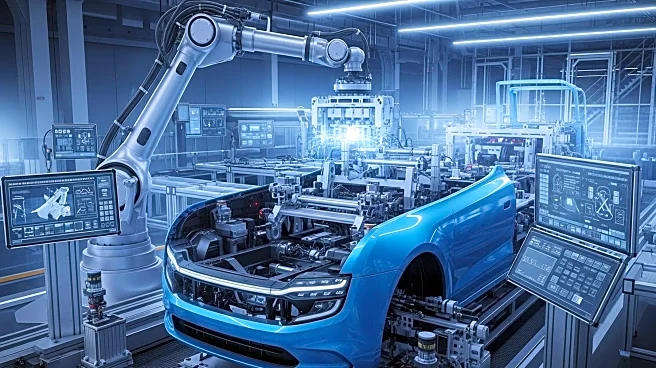What's Happening?
The Shyft Group, a North American specialty vehicle manufacturer, has advanced its electric vehicle division, Blue Arc EV Solutions, by automating the manufacturing of its Blue Arc EV truck. The company has developed a commercial electric delivery van tailored for last-mile logistics operations, utilizing a custom EV chassis designed from scratch. This approach addresses specific delivery fleet needs such as driver ergonomics, vehicle durability, and operational efficiency. The Blue Arc vans feature lightweight materials like aluminum and composites, achieving a driving range of over 220 miles and increased payload capacity. The Shyft Group has secured an initial order for 150 vehicles from an undisclosed major delivery company. The manufacturing process is supported by Rockwell Automation’s Plex Smart Manufacturing Platform, which digitizes key operational areas, enabling a transition from prototype to manufacturing-scale production in approximately nine months.
Why It's Important?
The automation of Blue Arc EV truck manufacturing by The Shyft Group signifies a significant advancement in the electric vehicle industry, particularly in the logistics sector. By creating a scalable production framework, the company is positioned to meet growing demand for electric delivery vehicles, which are crucial for reducing carbon emissions in urban areas. The implementation of digital infrastructure enhances production efficiency and accelerates development timelines, potentially setting a new standard for EV manufacturing. This development could lead to increased adoption of electric vehicles in commercial fleets, benefiting both environmental sustainability and operational cost-effectiveness for logistics companies.
What's Next?
The Shyft Group's successful automation of Blue Arc EV truck manufacturing may prompt further expansion of its production capabilities to accommodate larger commercial orders. As demand for electric delivery vehicles grows, the company might explore partnerships with other logistics firms to broaden its market reach. Additionally, advancements in digital manufacturing infrastructure could inspire other EV manufacturers to adopt similar technologies, potentially leading to industry-wide improvements in production efficiency and vehicle performance. Stakeholders, including environmental groups and logistics companies, are likely to monitor these developments closely.
Beyond the Headlines
The Shyft Group's approach to EV manufacturing highlights the importance of integrating digital technologies in production processes. This shift not only enhances operational efficiency but also aligns with broader trends in Industry 4.0, where automation and data-driven decision-making are becoming increasingly prevalent. The focus on lightweight materials and increased payload capacity reflects a growing emphasis on sustainability and resource optimization in vehicle design. As the logistics industry continues to evolve, the adoption of electric vehicles could lead to significant reductions in urban pollution and contribute to global efforts to combat climate change.









